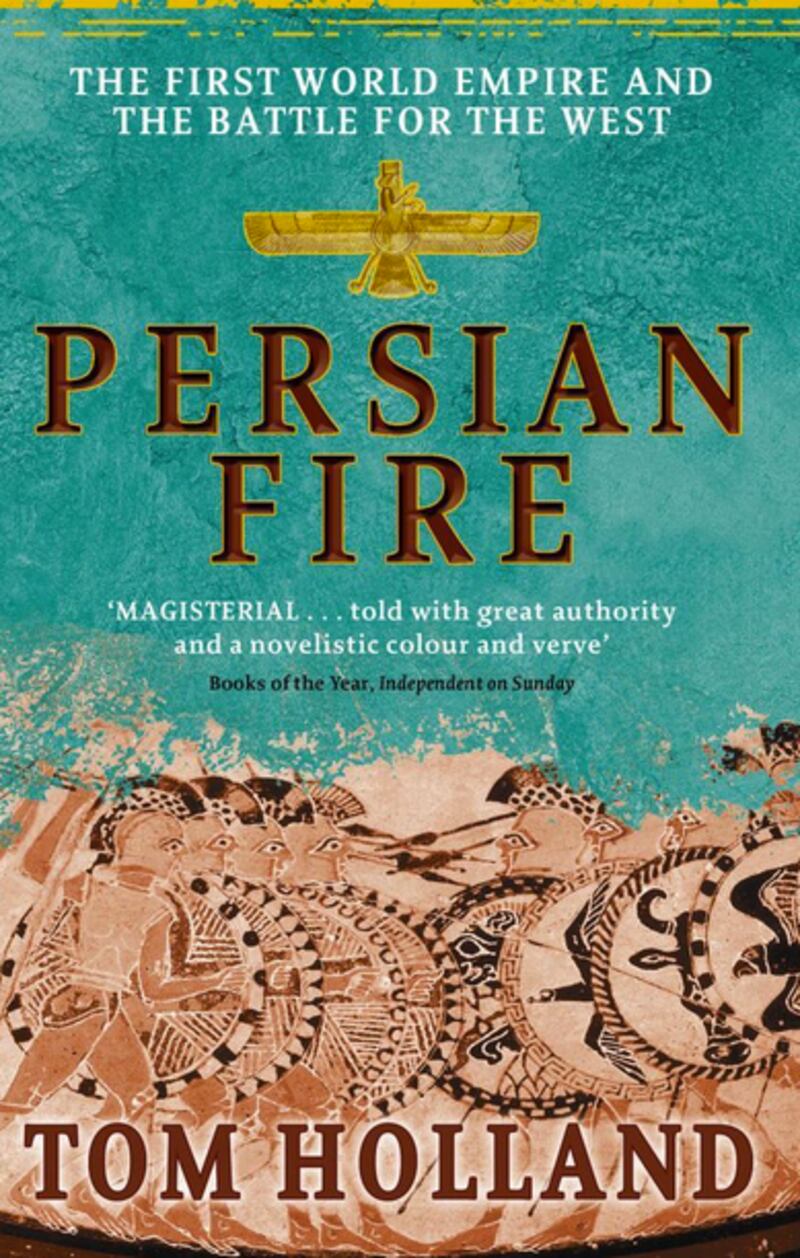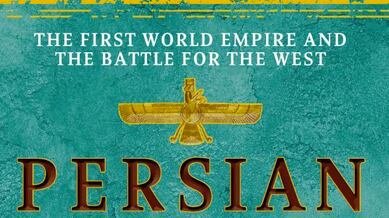
Necessary Preface: After my Book Club entry on Tom Holland's most recent book, In the Shadow of the Sword, Tom and I struck up a Twitter correspondence. He read and said generous things about Patriots. Now I'm back writing about him. Are we log-rolling? I can only answer that if I had not sincerely enjoyed and learned from both Persian Fire and Rubicon, it would be very easy to preserve a tactful silence. But I did, very much so, and it seems unfair in the opposite direction to omit them from the Book Club because Tom said something positive about my work. Anyway, the buck stops here, because - Tom, if you're reading - the next Frum novel won't appear until early 2014 at the earliest.
As everyone who ever read Byron or watched "300" knows, the Battle of Thermopylae pitted all the hopes of Western civilization against the oppressive pall of Oriental despotism. On the one side stood a culture committed to religious freedom and cultural autonomy; to commerce and the pursuit of knowledge. Across the battlefield, the soldiers of that first culture faced warriors from a culture of radical collectivism, brutal sexual exploitation, mindless traditionalism, and ruthless militarism. The first culture, of course, was that of Persia; the second, that of Sparta.
Persian Fire and Rubicon recount two of the most oft-told episodes in world history: the Persian-Greek wars of the 5th century BC and Julius Caesar's seizure of power in the 50s and 40s BC. These are subjects that have gained the attention of Herodotus and Shakespeare, among other people, and by now you'd think there would not be much left to say. You'd be wrong. In these two books, Holland takes the familiar and makes it strange.
How did it happen that the Roman republic tore itself to pieces and then submitted to a military dictatorship? How did warring, factionalized city-states on the edge of the known world repulse the first superpower? Those were the set-piece questions of what used to be called classical education. Appropriately for a post-9/11 world, Holland provides new answers by widening the aperture of the question, by shifting the classical world's eastern boundary to include Persia, rather than by following tradition to exclude it.
The ancient Persians did not write much down, and what they wrote was nothing like history. Reconstructing their story and their world requires artful recombination of other kinds of sources, close parsing of the physical record left by stones and coins, and an imaginative conjuring of the past.
In Holland's telling, the sequence of battles that started with the Athenian victory at Marathon in 490 BC and culminated eleven years later in the bloodbath at Plataea (place-names that were once drummed into schoolchildren like Yorktown or Hastings or the Marne or Queenston Heights), confronted an empire with a unprecedented capability to mobilize resources against small city-states with an unrivaled capability to inflict lethal violence.
Here is Holland's description of the Athenian phalanx's first meeting with the invading force on the beach at Marathon:
Extraordinary stories were later told of this advance. It was said that the Athenians ran the whole mile, as though men bold enough to attack the Persians for the first time must been somehow more than human. In truth, no man wearing the full panoply of a hoplite, some seventy pounds of bronze, wood, and leather, could possibly have run such a distance and still have energy left to fight effectively. Even in the relative cool of the early morning, sweat rapidly began to mingle with the dust kicked up by ten thousands pairs of feet, half-blinding the advancing hoplites and stinging their blinking eyes, so that their vision ahead of them - the outlandishly dressed archers reaching for their arrows, the slingers for their shot, the expressions of glee and disbelief in the Persian ranks - grew ever more obscured. Soon, as the Athenians crossed deeper into no man's land, the first arrows began to hiss down upon them; then, raising the monstrous weight of their shields to protect their chests, the Athenians did at last begin to run. Simultaneously, as though the phalanx were "some ferocious cornered creature, stiffening its bristles as it turns to face its foe," [Plutarch] those in the front three ranks lowered and aimed their spears, in preparation for the coming collision. By now, with some 150 yards still to travel, a storm cloud of arrows and slingshot was breaking over them, thudding into their shields, bouncing off their helmets, striking the odd hoplite in the thigh or through the throat, but still the Athenians, braving the black rain, only quickened their pace. Those of the enemy directly in their path had already begun to scramble to erect wicker defenses, as they realized, to their horror, that the wall of shields and iron-tipped spears, far from providing easy pickings for their bowmen, as they had at first imagined, was not going to be halted. A hundred years, fifty, twenty, ten. Then, as the Athenians' war cry, a terrifying ululation, rose even above the thundering of their feet upon the dry earth, the cacophony of clattering metal and the screams of the panic-striken enemy, the phalanx crunched into the Persian lines.
The impact was devastating. The Athenians had honed their style of warfare in combat with other phalanxes, wooden shields smashing against wooden shields, iron spear tips clattering against breastplates of bronze. Now, though, in those first terrible seconds of collision, there was nothing but a pulverizing crush of metal into flesh and bone; then a rolling of the Athenian tide over men wearing, at most, quilted jerkins for protection, and armed, perhaps, with nothing more than bows and slings. The hoplites' ash spears, rather than shivering, as invariably happened when one phalanx crashed into another, could instead stab and stab again, and those of the enemy who avoided their fearful jabbing might easily be crushed to death under the sheer weight of the advancing men of bronze.
LOC 3367-3397
- MORE TO COME-
This was the first of a four-part review. Read part two here and part three here.






